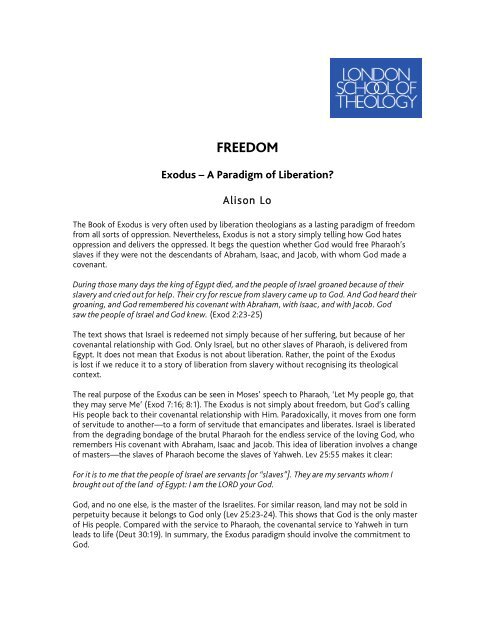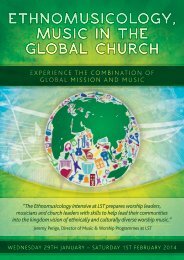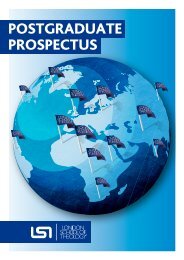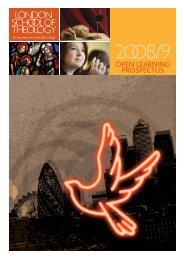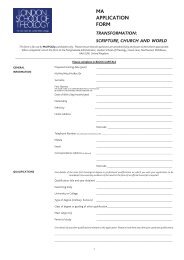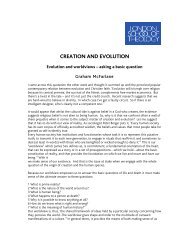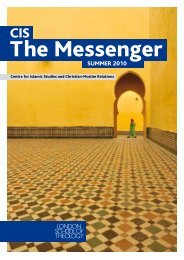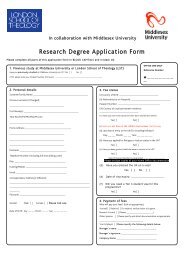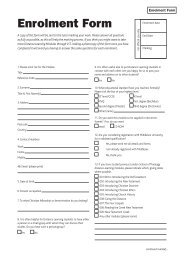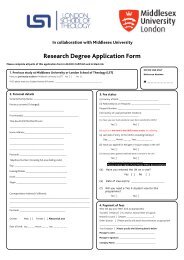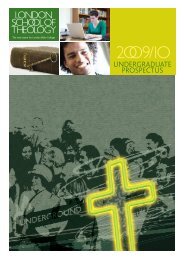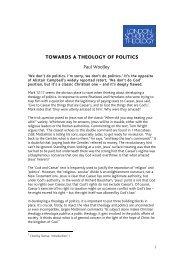FREEDOM - London School of Theology
FREEDOM - London School of Theology
FREEDOM - London School of Theology
Create successful ePaper yourself
Turn your PDF publications into a flip-book with our unique Google optimized e-Paper software.
<strong>FREEDOM</strong>Exodus – A Paradigm <strong>of</strong> Liberation?Alison LoThe Book <strong>of</strong> Exodus is very <strong>of</strong>ten used by liberation theologians as a lasting paradigm <strong>of</strong> freedomfrom all sorts <strong>of</strong> oppression. Nevertheless, Exodus is not a story simply telling how God hatesoppression and delivers the oppressed. It begs the question whether God would free Pharaoh’sslaves if they were not the descendants <strong>of</strong> Abraham, Isaac, and Jacob, with whom God made acovenant.During those many days the king <strong>of</strong> Egypt died, and the people <strong>of</strong> Israel groaned because <strong>of</strong> theirslavery and cried out for help. Their cry for rescue from slavery came up to God. And God heard theirgroaning, and God remembered his covenant with Abraham, with Isaac, and with Jacob. Godsaw the people <strong>of</strong> Israel and God knew. (Exod 2:23-25)The text shows that Israel is redeemed not simply because <strong>of</strong> her suffering, but because <strong>of</strong> hercovenantal relationship with God. Only Israel, but no other slaves <strong>of</strong> Pharaoh, is delivered fromEgypt. It does not mean that Exodus is not about liberation. Rather, the point <strong>of</strong> the Exodusis lost if we reduce it to a story <strong>of</strong> liberation from slavery without recognising its theologicalcontext.The real purpose <strong>of</strong> the Exodus can be seen in Moses’ speech to Pharaoh, ‘Let My people go, thatthey may serve Me’ (Exod 7:16; 8:1). The Exodus is not simply about freedom, but God’s callingHis people back to their covenantal relationship with Him. Paradoxically, it moves from one form<strong>of</strong> servitude to another—to a form <strong>of</strong> servitude that emancipates and liberates. Israel is liberatedfrom the degrading bondage <strong>of</strong> the brutal Pharaoh for the endless service <strong>of</strong> the loving God, whoremembers His covenant with Abraham, Isaac and Jacob. This idea <strong>of</strong> liberation involves a change<strong>of</strong> masters—the slaves <strong>of</strong> Pharaoh become the slaves <strong>of</strong> Yahweh. Lev 25:55 makes it clear:For it is to me that the people <strong>of</strong> Israel are servants [or “slaves”]. They are my servants whom Ibrought out <strong>of</strong> the land <strong>of</strong> Egypt: I am the LORD your God.God, and no one else, is the master <strong>of</strong> the Israelites. For similar reason, land may not be sold inperpetuity because it belongs to God only (Lev 25:23-24). This shows that God is the only master<strong>of</strong> His people. Compared with the service to Pharaoh, the covenantal service to Yahweh in turnleads to life (Deut 30:19). In summary, the Exodus paradigm should involve the commitment toGod.
However, the Exodus paradigm carries with it responsibilities. Should the God-given freedom beabused, we see another divine response—the Exile paradigm—a return to bondage because <strong>of</strong> thefailure to serve Yahweh. Let us remember that if liberation is the only message <strong>of</strong> the OldTestament, we may encounter disappointment in God when our expected “Exodus” does nothappen in times <strong>of</strong> great affliction.Alison Lo is Lecturer in Old Testament Literature and Biblical <strong>Theology</strong> at <strong>London</strong> <strong>School</strong> <strong>of</strong><strong>Theology</strong>.


